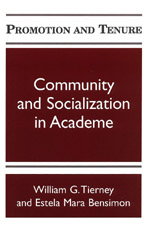 (Reprinted with permission from the Journal of Higher Education, written by Bob Boice.)
(Reprinted with permission from the Journal of Higher Education, written by Bob Boice.)
“Tenure,” declare William G. Tierney and Estela Mara Bensimon, “is the strongest example of a socializing mechanism for a new faculty.” And, they say, a close examination of tenure experiences explains what keeps novice professors from surviving: They fail if they try to preserve their individuality, particularly if they are women or people of color.
Promotion and Tenure is a tightly organized, informative book about promotion and tenure. Tierney and Bensimon asked 300 faculty members about the rules of the tenure and promotion “game” at their campuses and learned, for example, that although overt race and sex discrimination was exceptional, white male newcomers tended to be treated better than white women, and both of them better than an African-American woman.
Tierney and Bensimon criticize customary promotion and tenure processes, in particular an obsessive emphasis on publishing about traditional topics and in elite outlets: “Typical junior faculty are socialized not to take intellectual risks and not to question assumptions, because doing this might impede their efforts to have their work published.” They also recommend strategies to improve the process.
This is a useful book. Its critique of the usual promotion and tenure policies is exceptionally innovative, well stated, and worth reading. Its crisp summary of the unreasonable challenges faced by nontraditional newcomers to the professoriate should appeal to busy readers—even to overscheduled new hires themselves. And its brave, unflinching depiction of how well tenure works deserves more emulation among those of us who study new faculty and fear offending administrators who want only good news.